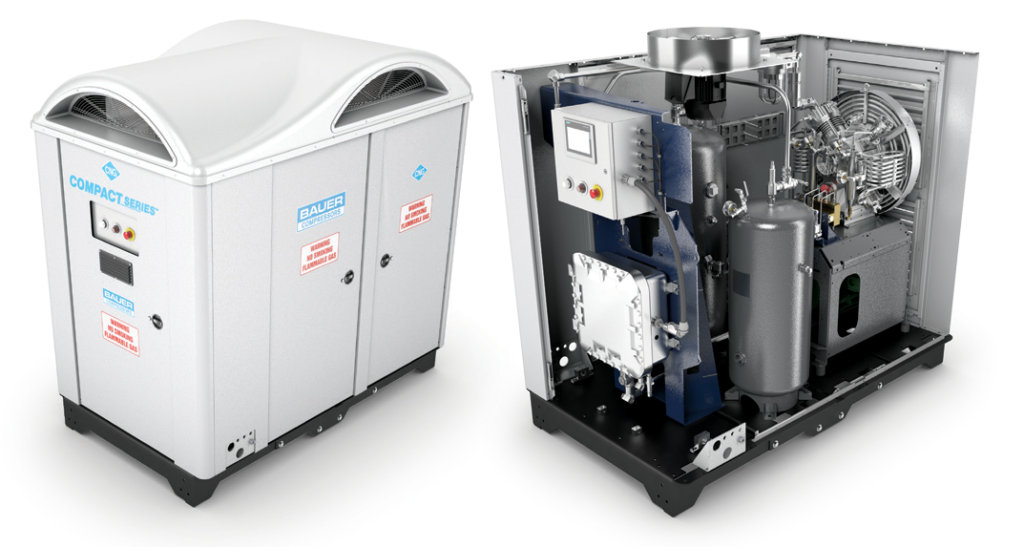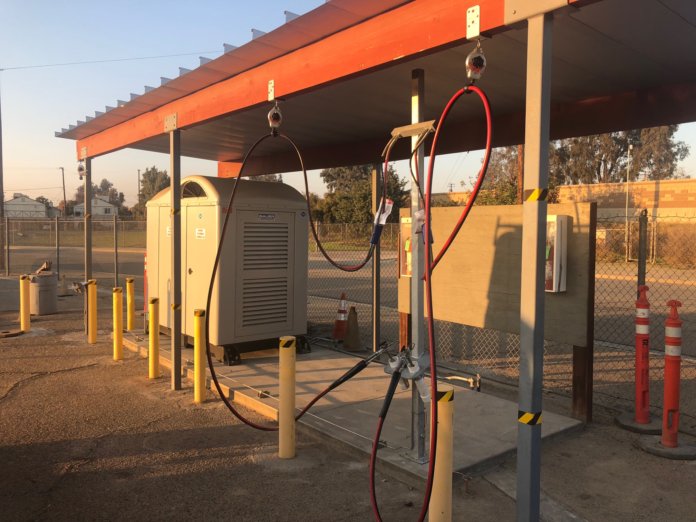California’s Fresno County Rural Transit Agency, which has a service area of some 6,000 square miles, is replacing outdated CNG fueling equipment with larger units from Bauer Compressors at the same time it looks to an electric future, as mandated by the state for 2040.
FCRTA’s experience with CNG goes back nearly 40 years, says general manager Moses Stites. The current CNG fleet consists of seven 35-foot, 2016 ElDorado vehicles and 30 Glaval Bus vehicles on GMC chassis.
“We have never had any diesel buses,” he tells NGT News.
Paso Robles, Calif.-based Revolution CNG is replacing small FuelMaker units with Bauer Compressors equipment at 13 municipal yards used by the county agency.
“The smaller units didn’t always get the job done,” Stites says, sometimes requiring compressors to be switched in the middle of a fill.
“We used them in relays,” he says.
According to Revolution CNG President Keith Iaia, the agency “found themselves adding multiple units to their sites to keep up with demand and to take some of the strain off of the machines, which were not designed for continuous duty.
“In 2018,” he says, “many FCRTA sites were employing 10 or more of these small compressors per site in order to meet demand and provide adequate redundancy.”
Revolution, an authorized Bauer CNG distributor with a portfolio of CNG compression options, proposed an upgrade initiative.
“We finally decided to upgrade to large units,” says Stites. “We’d rather use our personnel resources in other areas.”
“At larger locations with 10 or more of the older machines on site,” Iaia says, “a Bauer [Compact] C15.2 compressor was specified… With an output of 22 cfm, the 15.2 can do the work of about 14 of the machines it has replaced.”

At sites with lower total requirements, the Bauer Micro 120 was specified. Iaia describes the Micro 120 as a compact, 50-inch cube producing 9 cfm, able to replace half a dozen of the previous machines. As an added plus, the Micro can operate on single-phase, 220-volt power for installations where three-phase power is not available.
Revolution has installed Bauer C15.2 CNG equipment at the FCRTA’s Kingsburg location, with additional stations currently under construction in Mendota, Firebaugh and San Joaquin.
“Once those sites are completed, the remaining FRT facilities will be evaluated and prioritized for upgrades,” Iaia says.
“With Bauer’s wide range of CNG compressor sizes, we are able to offer Fresno Rural Transit the compressor size to meet their specific needs at each site,” says Paula Hebert, CNG business development manager at Bauer Compressors. “As the older equipment is removed and new Bauer ‘state-of-the-art’ packages are installed, Fresno Rural Transit will benefit from the lower cost of ownership, and new technology at an affordable cost.
“Bauer Compressors is excited to partner with Fresno Rural Transit and Revolution CNG to make this opportunity successful,” she tells NGT News.
Iaia says Revolution CNG has enjoyed “great success” with Bauer’s Micro 120 and C15.2 compressors, having installed them for customers including the San Francisco Zoo and the University of California, as well as for fork lift fueling and small fleets.
FCRTA’s Stites notes that while his agency is mandated to look to electric buses, and indeed to switch to electric buses altogether by 2040, it has a “self-imposed target date” of all-battery buses by 2025.
FCRTA is investing further in CNG, in part, to help support other clean CNG vehicles, like sweepers, at the far-flung municipalities it serves, he says.
FCRTA took delivery of two 35-foot all-battery BYD buses last year and is getting ready to order two 30-foot BYD vehicles, Stites says. FCRTA also has five 40-foot battery buses from Proterra, six Zenith vans, and 10 Chevy Bolt cars (soon to be 25) – all 100% battery-powered.
In a further commitment to CNG, FCRTA is planning an upgrade of its headquarters maintenance facility in Selma (between Fresno and Kingsburg), where it will offer public access CNG fueling for heavy vehicles. The upgrade could include vehicle conversion capability, as well, Stites says.
Rich Piellisch, an NGT News contributing writer, has been covering the alt-fuels sector for more than 25 years.






